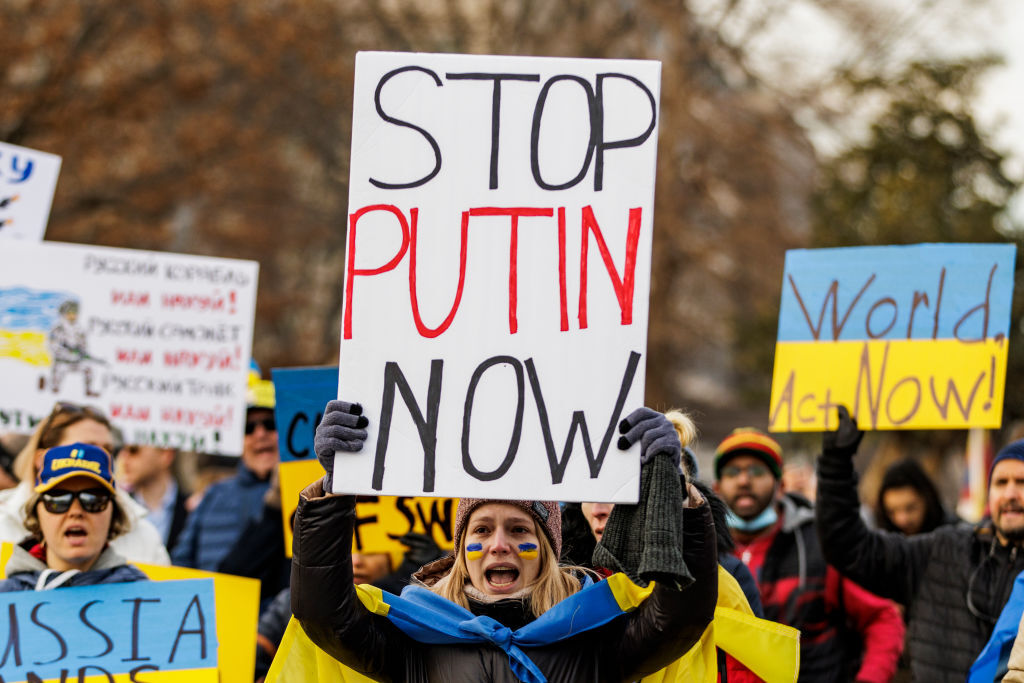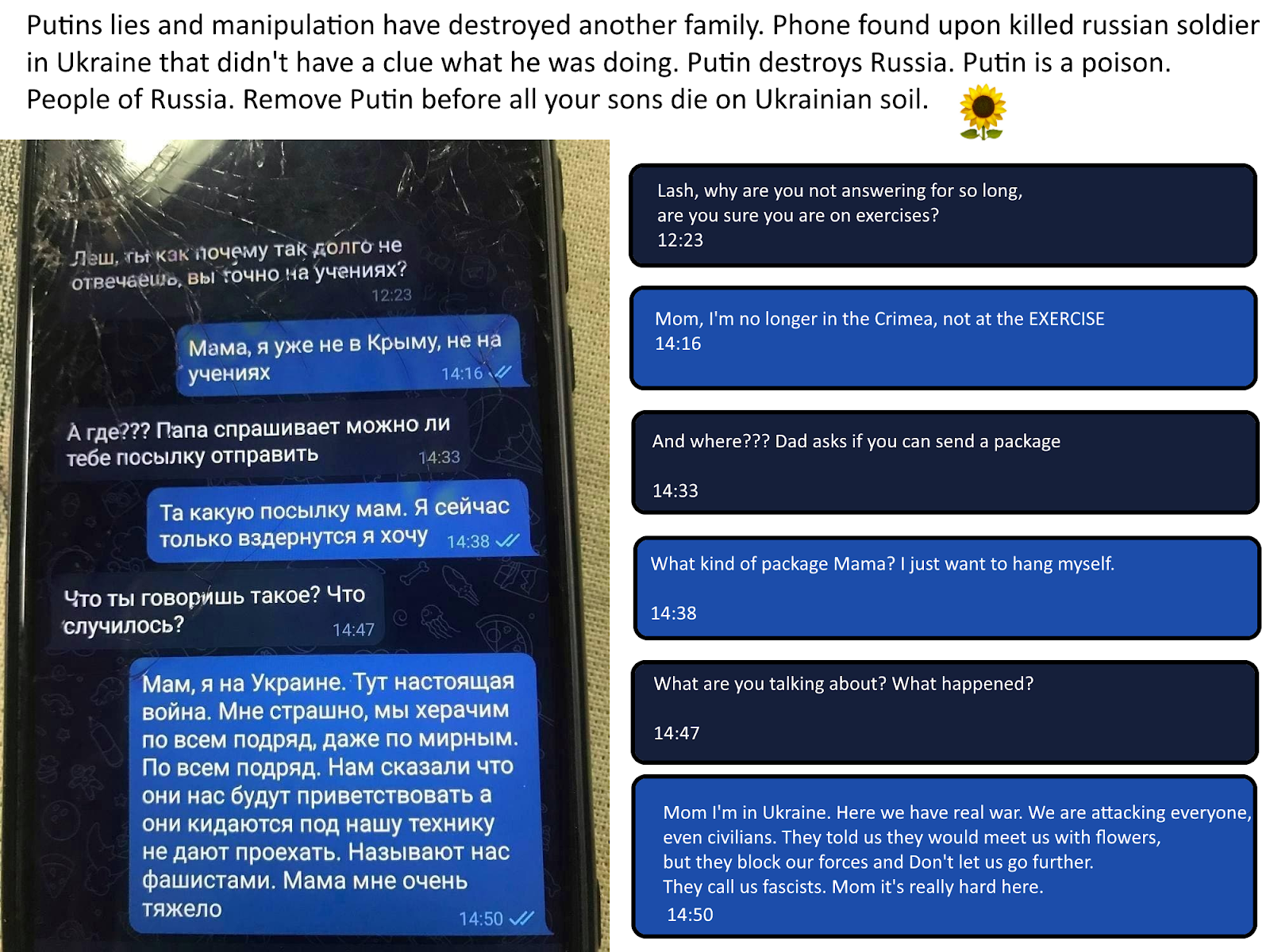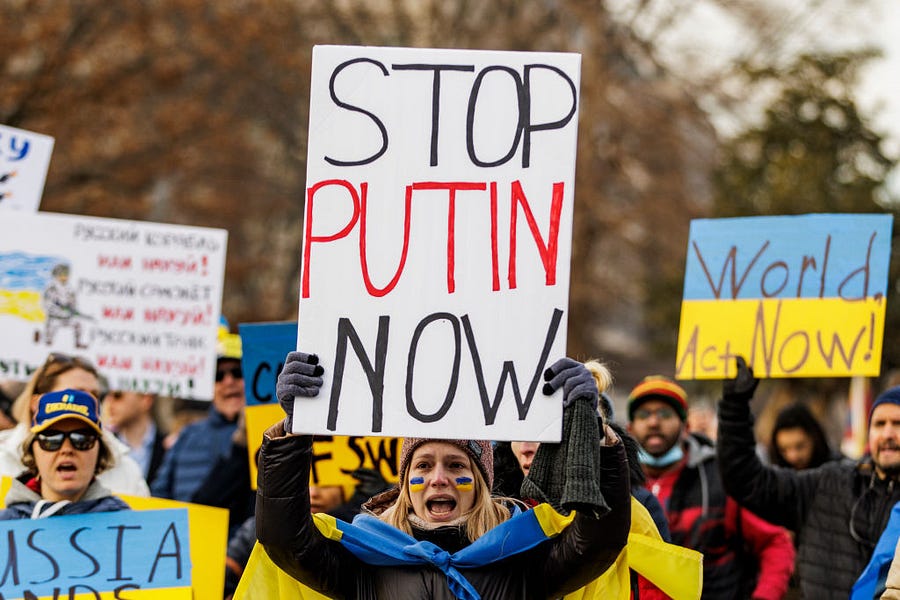Happy Tuesday! We learned yesterday that before President Volodymyr Zelensky grew into one of the most inspiring resistance leaders of a generation, he voiced Paddington Bear in the Ukrainian versions of Paddington and Paddington 2.
As the character’s creator Michael Bond once wrote, “young [Paddington] has a habit of bringing people closer together in the end.”
Quick Hits: Today’s Top Stories
-
A senior Biden administration official told reporters Monday the United States was coordinating with allies to prevent Russia’s central bank from selling dollars, euros, and other foreign currencies in its reserves to prop up the ruble, which ended Monday down 21 percent against the dollar since Friday and worth less than a penny. Russia’s central bank announced Monday it would keep the Moscow Exchange closed on Tuesday for a second consecutive day “due to the current situation,” and later added morning and evening trading would be closed through March 5.
-
One day after Germany reversed its longstanding policy against sending weapons to warzones to deliver 1,000 anti-tank weapons and 500 Stinger anti-aircraft defense systems to Ukraine, German Chancellor Olaf Scholz announced it would substantially boost its own defense spending, pledging to soon adhere to NATO’s recommendation of 2 percent of GDP. Scholz also told lawmakers Germany must “overcome” its dependence on energy imports by building more liquefied natural gas terminals, and an economic minister did not rule out extending the life of three nuclear power plants slated to close this year.
-
Breaking with its long tradition of neutrality, Switzerland’s Federal Council decided on Monday to join the European Union in penalizing Russia, closing its airspace to Russian aircraft and imposing sanctions directly on President Vladimir Putin, Prime Minister Mikhail Mishustin, and Foreign Minister Sergey Lavrov. South Korea’s Foreign Affairs Ministry also announced Monday it would join much of the West in excluding Russian banks from the SWIFT system and support the U.S. in blocking exports of certain “strategic items” to Russia.
-
Secretary of State Antony Blinken announced Monday the United States had suspended operations at its embassy in Minsk, Belarus, and authorized family members and non-emergency employees at its embassy in Moscow, Russia, to depart the country. The moves were made because of “security and safety issues” following Russia’s invasion of Ukraine.
-
Olivia Dalton, a spokeswoman for the U.S. Mission to the United Nations, announced Monday the U.S. is “beginning the process” of expelling 12 diplomats from the Russian Mission, alleging they have “abused their privileges of residency in the United States by engaging in espionage activities that are adverse to our national security.” The Russian ambassador to the U,N. said the U.S.’s explanation for the expulsions was “not satisfactory.”
-
One day after BP divested its 20 percent stake in the Russian state-owned oil company Rosneft, Shell announced its intention to end its involvement with the Nord Stream 2 pipeline and exit its joint ventures with Gazprom.
-
U.S. Capitol Police announced Sunday that, out of “an abundance of caution,” it will once again put up an “inner-perimeter fence” around the Capitol building for President Joe Biden’s State of the Union Address. The White House—and most remaining congressional offices—lifted mask mandates for staff this week.
-
Senate Democrats failed to advance the Women’s Health Protection Act on Monday, coming 14 votes shy of moving forward with the legislation that would codify Roe v. Wade’s abortion protections into federal law.
-
Russian national and club soccer teams will be suspended from both FIFA and UEFA competition “until further notice,” the two organizations announced Monday in a move that bars the country from qualifying for the 2022 World Cup. The International Olympic Committee recommended federations and event organizers not allow Russian and Belarusian athletes to participate in international competitions.
-
Rep. Ted Deutsch of Florida announced Monday he will leave Congress later this year to become CEO of the American Jewish Committee, making him the 31st House Democrat this cycle to decide not to run for reelection. GOP Rep. Fred Keller also announced he won’t run for reelection this year, citing Pennsylvania’s redrawn congressional map that would’ve forced him to primary an incumbent Republican.
Assessing the War So Far

By just about any measure you can think of, the first five days of Russian President Vladimir Putin’s “special military operation” in Ukraine have been a complete and abject failure. Opposition to his invasion united the democratic world more quickly than even some Western countries anticipated, resulting in the imposition of crippling economic sanctions that have tanked the ruble and forced Russia’s central bank to double its main interest rate. From energy companies like Shell and BP, to sports organizations like FIFA and the IOC, to the ‘90s punk rock band Green Day, the international community wants nothing to do with Russia. Police are scrambling to arrest thousands of protesters per day in a useless effort to keep a lid on internal dissent, and at least a few of the oligarchs seem to have had enough.
But amplifying all those problems for Putin is the fact the Russian military has repeatedly failed to meet its objectives. After about 120 hours, according to a senior U.S. Pentagon official, the airspace over Ukraine remains contested, Ukrainian air defenses remain intact, and Russian forces have—despite committing nearly 75 percent of their pre-invasion buildup and launching nearly 400 missiles—not yet captured a major population center. British intelligence reported this morning Russian advances have “made little progress” over the past 24 hours due to “continuing logistical difficulties.”
It’s still early days, of course, but the fact that no major Ukrainian city has fallen into Russian hands is a minor miracle. According to the International Institute for Strategic Studies’ annual “Military Balance” report, Ukraine’s annual defense budget is roughly 10 percent of Russia’s. Putin has at his disposal five times as many armored vehicles, 10 times as many aircraft, and nearly five times as many active duty personnel. Western aid has narrowed those disparities slightly in recent months—and days—but the two militaries are by no means on equal footing.
So why have Russia’s early operations stalled? Most military analysts attribute Moscow’s lack of success to erroneous intelligence and poor planning. “Today may have been the worst day for the Russian military in Ukraine so far,” Rob Lee—a Russian defense policy expert at King’s College—said on Sunday. “They still have huge advantages and are having success in the south, but the Russian military is making basic mistakes and demonstrating poor small unit competence. The restrained strategy has also allowed the Ukrainian military to achieve successes, build momentum, and buy time.”
Possibly born of a desire to both avoid domestic revolt and limit Ukrainian animosity in the event of a post-invasion occupation, the Kremlin’s initial strategy opted for speed over power. “They wanted to rapidly seize critical areas in the hopes that that would end the conflict and facilitate their overall plan,” John Spencer—chair of Urban Warfare Studies at the Modern War Institute—told The Dispatch. “It was a huge risk that did not work for them—and it was really hubris to think that it would. Clearly, they got the intelligence wrong on how much Ukrainians would resist.”
Russia targeted Ukraine’s airfields and air defense systems with missile strikes early on in an unambiguous attempt to achieve air superiority, but didn’t commit nearly enough resources to fully boxing Ukraine out of the sky. And on the ground, Russian forces split up into three main groups, heading toward Kyiv from Belarus in the north, Sumy and Kharkiv in the northeast, and Crimea in the south. More often than not, these divisions have been traveling along roads in small convoys that—without air superiority—are exceedingly vulnerable to being picked off by Ukrainian drones and RPGs. Numbers from Ukraine’s Ministry of Foreign Affairs should be taken with several grains of salt, but the agency claimed yesterday Russia had already lost 191 tanks, 816 armored vehicles, six anti-aircraft systems, and 291 other vehicles.
It may sound cheesy, but the success of the underdog’s resistance thus far can—at least in part—be attributed to its forces’ sense of purpose and moral clarity. Ukraine’s military has gained eight years of experience fighting Russia-backed separatists in the Donbass region, but it has been joined this week by thousands upon thousands of Ukrainian civilians—inspired by the servant leadership of President Volodymyr Zelensky—eager to take up arms, fend off invaders, and defend Ukraine’s independence. Legendary tales of bravery—like the Snake Island soldiers who told a Russian warship to “go f— itself” (and were actually, it turns out, taken prisoner rather than killed!)—are certainly helpful in this regard. The cause is even attracting foreigners, with a group of American and British special forces veterans reportedly preparing to answer Zelensky’s call for help fighting Russian “war criminals.”
For Russian forces, the motivations are much less clear. “Most Russian soldiers are young and have little interest in fighting Ukrainians as an opponent,” Michael Kofman—director of Russia Studies at CNA—said yesterday. “What I’ve seen so far suggests that Russian troops were unaware they would be ordered to invade, and appear reluctant to prosecute this war. They don’t see Ukrainians as adversaries and the military didn’t prepare them for this campaign.” The Dispatch cannot verify their legitimacy—and they very well could be part of a disinformation operation—but the Ukrainian ambassador to the U.N. on Monday read aloud supposed text messages between a Russian soldier killed in action and his mother.

“Not knowing what the full plan is—and your role in that plan—is severely demoralizing,” said Spencer, a 25-year Army veteran. “[The Russians] are not being given that leadership and guidance at this point. … It will expose your weaknesses if you don’t have strong, cohesive, small units.”
Putin is, understandably, furious with how things have gone thus far, with NBC News reporting the United States has intelligence indicating he’s been expressing “unusual bursts of anger” with his inner circle in recent days. But that anger unfortunately appears to have been channeled into a revamped military strategy more in line with Russia’s more traditional approach: overwhelming firepower.
Despite the Kremlin’s claims to the contrary, airstrikes in the invasion’s first few days killed or wounded hundreds of Ukrainian civilians. But Moscow turned it up several notches on Monday, subjecting residential areas in the northeastern city of Kharkiv—Ukraine’s second largest—to incredibly heavy, seemingly random shelling. A local official estimated at least 11 were killed, while Ukraine’s general staff claimed dozens died and hundreds were wounded. A Financial Times reporter spoke with a doctor at a local hospital who treated a teenage girl with severe lung damage who later died. Hours before we sent this newsletter, Russia hit a local government building in the center of downtown Kharkiv, reportedly injuring six people, including a child. A similar strike reportedly hit the southern city of Kherson around the same time.*
“We obviously see that residential areas and civilian targets are being struck,” a Pentagon official told reporters yesterday. “They are causing civilian harm and they are striking civilian targets. Whether it’s intentional and directed, we’re just not in a position to be able to confirm that.” Karim Khan, a prosecutor for the International Criminal Court, announced yesterday he was opening an investigation into Russia’s potential war crimes and crimes against humanity.
Whether or not Russia’s recent escalations violate international law, they’re a big reason why many Western military analysts have tempered their optimism for Ukraine’s forces. “Except for heavy shelling around Kharkiv, use of fires have been limited compared to how the Russian military typically operates,” Kofman said yesterday, noting he was beginning to see “major” adjustments. “Russian military is suspending unsupported thunder runs, resupplying, and reorganizing. Ukraine’s military has performed really well, but I think we’re going to see a different Russian approach moving forward.”
According to the Pentagon official, Russia’s central goal remains reaching and encircling Kyiv, potentially adopting siege tactics once in place. Crucial to any such plan would be the nearly 40-mile-long military convoy of tanks and other Russian military vehicles picked up by satellite imagery on Monday. It still has several miles to go before it reaches the capital city—and Ukrainian forces have reportedly picked off bits and pieces of it—but a convoy of that size will certainly wreak havoc upon its arrival.
“The violence is going to significantly increase,” Spencer concluded. “One, because of the challenges they faced in the failed plan of a light, fast, takedown. And two, those other assets are coming into range, into the theater. They haven’t even brought in all that they had positioned on the borders.”
Worth Your Time
-
Rather than exposing divisions within the Western alliance, did Putin’s invasion of Ukraine revitalize the liberal order? “Polish citizens collected 100 tons of food for Ukraine in two days. Bars are pouring out Russian vodka. Iconic architecture in cities all over the free world is lit up with the colors of the Ukrainian flag to show solidarity,” Kori Schake writes in The Atlantic. “Sports teams are refusing to play Russia in international tournaments. The London Philharmonic opened its Saturday concert by playing the Ukrainian national anthem, and the Simpsons modeled Ukrainian flags. This is what free societies converging on an idea looks like. And the idea is this: Resist Putin’s evil. … Those of us already living in free societies owe Ukrainians a great debt of gratitude. Their courage has reminded us of the nobility of sacrifice for just causes. As Ronald Reagan memorably said, ‘There is a profound difference between the use of force for liberation and the use of force for conquest.’ What Ukrainians have done is inspire Americans and others to shake ourselves out of our torpor and create policies of assistance to them, in the hopes that we might one day prove worthy of becoming their ally.”
-
In Commentary, Noah Rothman ponders what a potential offramp might look like. “There is precisely no appetite in the West for allowing Russia a face-saving way out of this crisis,” he writes. “[But] as unappetizing as the prospect is, Western policymakers must consider the circumstances that Russia needs in order to confidently deescalate this situation. This is an exquisitely delicate moment. Among Ukraine’s Western supporters, the temptation toward triumphalism will be difficult to reject, but cooler heads must prevail. Ukrainian’s [sic] national ambitions cannot be sacrificed, or the West will be menaced further by revisionist actors all over the globe. But the Russian regime also needs a soft place to land if it is expected to accept a meaningful peace that doesn’t leave Ukraine a broken nation in a perpetual state of semi-frozen conflict on the borders of NATO. Today, with bullets flying, bombs bursting, and a burgeoning humanitarian catastrophe unfolding in real-time, that’s a hard pill to swallow. But a failure to make those preparations today could produce an infinitely more terrible set of circumstances tomorrow.”
Presented Without Comment
Also Presented Without Comment
Also Also Presented Without Comment
Toeing the Company Line
-
It’s Tuesday, so that means Dispatch Live is back! Tune in tonight at 8 p.m. ET/5 p.m. PT for a State of the Union preview show with Jonah, David, Sarah, and Declan.
-
On Monday’s episode of Advisory Opinions, David and Sarah discuss high school admissions policies in Virginia, Clarence and Ginni Thomas’ alleged conflicts of interest, and the role of legislation in regulating which ideas are allowed in public schools. Plus: The power of Ukrainian courage.
Let Us Know
Fill in the blank for President Biden in advance of tonight’s speech: “The state of our union is __________________.” Please explain your answer.
Reporting by Declan Garvey (@declanpgarvey), Charlotte Lawson (@lawsonreports), and Steve Hayes (@stephenfhayes).
Correction, March 1, 2022: Kherson was originally identified as a state in southern Ukraine; it is a city.





Please note that we at The Dispatch hold ourselves, our work, and our commenters to a higher standard than other places on the internet. We welcome comments that foster genuine debate or discussion—including comments critical of us or our work—but responses that include ad hominem attacks on fellow Dispatch members or are intended to stoke fear and anger may be moderated.
You are currently using a limited time guest pass and do not have access to commenting. Consider subscribing to join the conversation.
With your membership, you only have the ability to comment on The Morning Dispatch articles. Consider upgrading to join the conversation everywhere.